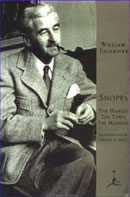Books |
The Hamlet, The Town, The Mansion
William Faulkner
By
Published: Jan 01, 2005
Category:
Fiction
Oprah goofed. Yes, Oprah — everyone’s pal Oprah, please-run-for-President Oprah, sure-to-be-beatified Oprah — has made a boo boo. Doesn’t happen often. But when it does…well, this time she’s blown an entire summer.
All over a book selection.
Late last week, Oprah’s Book Club chose three novels by William Faulkner for the summer months: "As I Lay Dying," "The Sound and the Fury" and "Light in August."
These are great novels. I know. I haven’t just read them, I’ve studied them. All of them — at Harvard, my English tutorial one term was nothing but Faulkner. With a bourbon in one hand and a pencil in another, I spent the weeknights of several months plowing through a dozen Faulkner novels and a ream of Faulkner criticism. And while I am the better person for the experience — and a lifelong admirer of Faulkner’s achievement — what I mostly remember is what a tough slog it was. What work it was. How certain I was that I’d never want to read most of these novels — these great American classics — ever again.
When Oprah speaks, America listens, so the three-volume set of the novels Oprah picked — 1,152 pages of Faulkner, a bargain on Amazon.com at $17.97 — has leapt to #2 on the Amazon bestseller list. That means houses across the country which only have "The Da Vinci Code" and "Tuesdays with Morrie" on their bookshelves will now greet books by a novelist who would have been lionized by the symbolist writers of 19th century France. That’s thrilling.
But I have no illusions about this summer reading project — I’ll be stunned if 10% of Oprah’s devotees reach page 100 of any of these novels.
The tragedy in Oprah’s summer reading list? There are three books by Faulkner much better suited to her purposes. She just picked the wrong Faulkner.
The right Faulkner for Oprah fans? Three novels that Faulkner conceived as a trilogy: "The Hamlet," "The Town" and "The Mansion." Compared to other Faulkner novels, these 1,088 pages ($17.61 at Amazon.com) read like pulp fiction — the plot is lurid, the motivations of the characters couldn’t be more contemporary, and the style breaks no new ground. They’re not Grisham, but they’re close.
Think back to high school. You were assigned to read a Faulkner short story, weren’t you? If it wasn’t "The Bear," it was "Barn Burning." Well, the main character in "Barn Burning" was Abner Snopes, a straight-from-Satan Mississippian whose idea of resolving his differences with neighbors and employers was to burn their barns. Flem, his eldest son, had no choice but to learn his father’s lessons well.
"The Hamlet" is the story of Flem Snopes, all grown up and just about as unethical as his father, and of Flem’s effect on the small, unsuspecting village of Frenchman’s Bend. Flem’s impotent — but only below the belt. He doesn’t plan to die a lowly worker. So when he discovers that Will Varner’s daughter Eula is pregnant without a husband, he steps forward and offers to help Will out. That makes Flem the son-in-law of one of the town’s leading landowners — and neatly positioned to start taking over the hamlet. (This book was adapted into a film called "The Long Hot Summer," starring Paul Newman, Joanne Woodward, Orson Welles, Lee Remick and Angela Lansbury.)
Eula is a sensual woman, with a body that turns any man’s thoughts to just one thing. In "The Town," Flem seems not to notice. He’s too busy getting promoted — first to chief of the power plant, then to vice president of the bank. Can the presidency of the bank be denied him? And, along the way, can he get his revenge on the man who’s been having an eighteen-year affair with Eula?
In the final volume, justice finally comes Flem’s way. But not before Frenchman’s Bend has been transformed — eaten alive, really — by the kind of man never before seen in these parts. That is because Flem represents the unethical, unrestrained capitalism that only could flourish in the South after the Civil War had stripped it of its codes of honor. Flem has only one goal and one emotion — power, and the love of it. In our time, we know this kind of man well. And, as often as not, we live in "communities" where people used to be like family to their neighbors and now barely recognize them to wave.
Rapacious capitalism. The loss of our sense of "home." Men who use women to advance their master plans. These are themes that the women in Oprah’s nationwide book club could really get into.
Or they could do — could try to do, anyway — the reading Oprah’s assigned them.
Good luck, ladies. "As I Lay Dying" has multiple narrators who favor the stream-of-conscious style. The first section of "The Sound and the Fury" is narrated by an idiot who slips in and out of the present with only italics to guide you. "Light in August" is a comparatively straightforward "traditional" novel, but it’s 528 pages.
It’s too bad. William Faulkner is probably the greatest literary novelist our country ever produced. The way into his writing is through books that are pleasurable — great stories, unforgettable characters. For me, those books are "The Hamlet," "The Mansion" and "The Town." Maybe after Oprah’s fans have struck out with the brainbusters, they’ll give these books a chance.
To buy the Snopes trilogy — "The Hamlet," "The Mansion" and "The Town" — from Amazon.com, click here.
To buy the Oprah selections from Amazon.com, click here.


